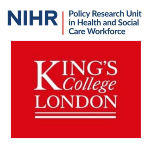Maureen Crane, Visiting Senior Research Fellow, King’s College London.

Jeremy Swain
It was with deep sadness I heard about the death on 27 May 2024 of Jeremy Swain. He was a key figure in tackling homelessness and particularly rough sleeping for decades. Following a volunteering experience with the Cyrenians in London, Jeremy became a street outreach worker at Thames Reach in 1984 followed by periods as a resettlement worker and then a housing service manager within the organisation. He became Chief Executive of Thames Reach in 1999 and remained in the post until 2018, when he became Deputy Director for Homelessness and Rough Sleeping Delivery at the Ministry of Housing, Communities and Local Government. He was responsible for overseeing programmes developed through the Rough Sleeping Strategy, and later became a senior adviser for the Covid-19 Rough Sleeping Task Force. In 2017 he received a City Lit Lifetime Achievement Award for his contribution in helping people who had been homeless to develop the skills and confidence to gain employment.
I first met Jeremy in 1994 when starting fieldwork for my PhD. I was keen to interview older people who were homeless and he gave permission for me to visit Thames Reach’s hostels to see if any residents would be willing to take part. He showed great interest and enthusiasm in research on homelessness and understanding why people become homeless and what is needed to help them move on. He commissioned Tony Warnes (former Professor of Social Gerontology, University of Sheffield) and myself to undertake evaluations of programmes and services within Thames Reach, and he worked closely with many other homelessness sector service providers in London, including with Charles Fraser, former Chief Executive of St Mungo’s. Collectively these organisations commissioned us to undertake comprehensive studies of the needs of single people in London who were homeless and of the role of hostels in the early 21st century.
Over the years Jeremy continued to be a great supporter of my research on homelessness, both at the University of Sheffield and at King’s College London. He was always keen for his organisation to participate in our government-funded research, and Thames Reach staff and service users played an active role in studies such as the Three-Nation Study of the causes of homelessness among older people, the FOR-HOME study and Rebuilding Lives. Through his knowledge, guidance and support over many years, he helped steer our Homelessness Research Programme to what it is today – from relatively small evaluations of services to large scale, multi-site studies concerning people who are homeless and services for them.




 In the context of ongoing challenges to the recruitment, retention, and motivation of around three million staff employed in health and social care, the NIHR Policy Research Unit in Health and Social Care Workforce in the Policy Institute at King’s College London (KCL) has announced its programme of work as it sets out on its next five years (2024-28).
In the context of ongoing challenges to the recruitment, retention, and motivation of around three million staff employed in health and social care, the NIHR Policy Research Unit in Health and Social Care Workforce in the Policy Institute at King’s College London (KCL) has announced its programme of work as it sets out on its next five years (2024-28).